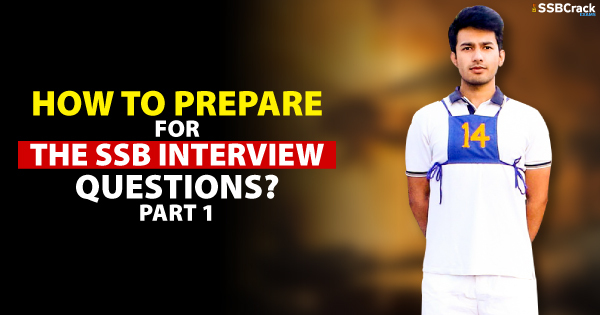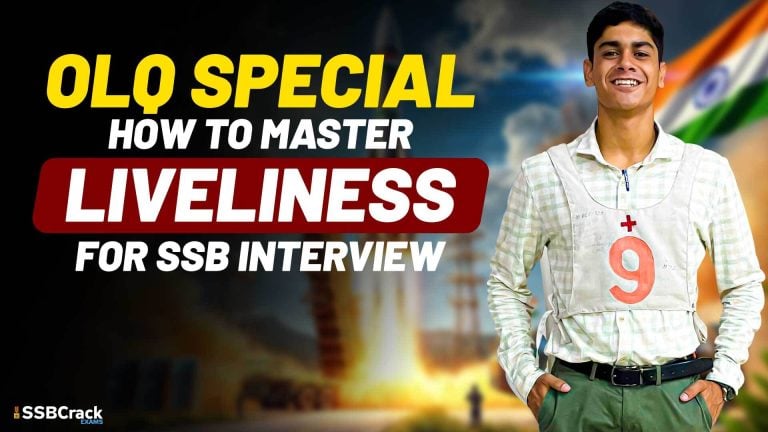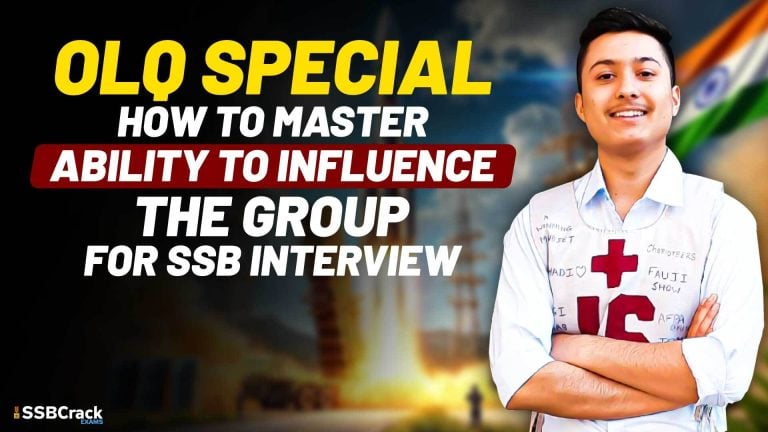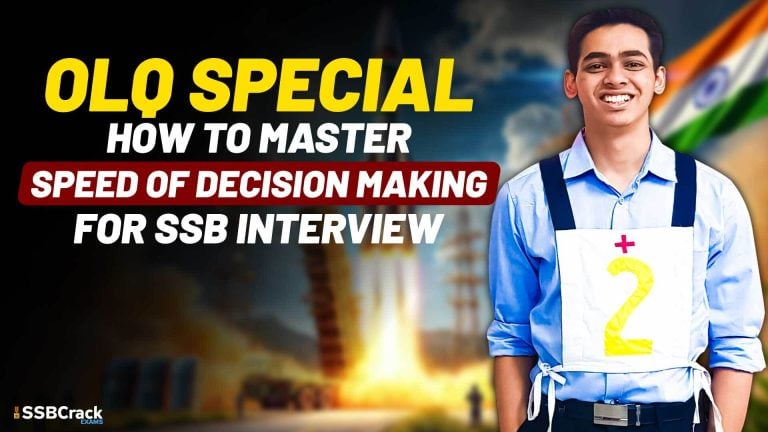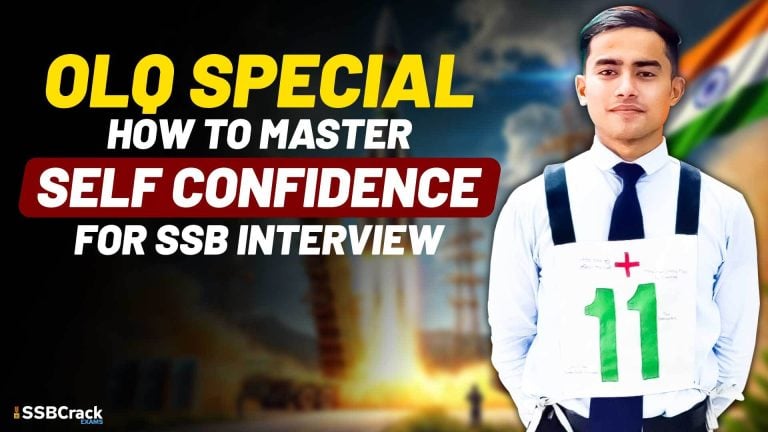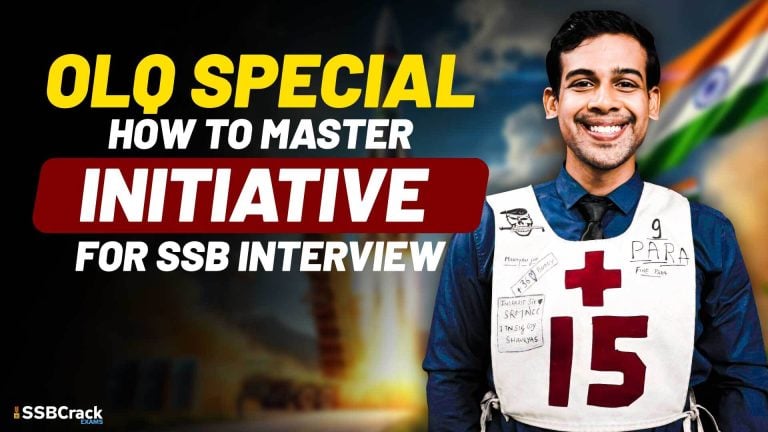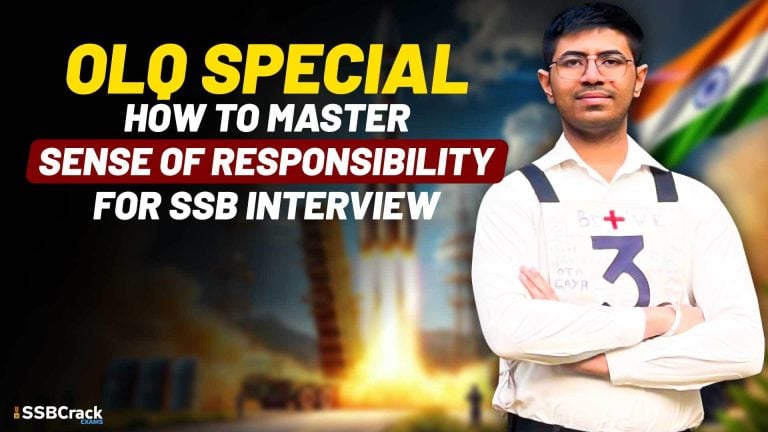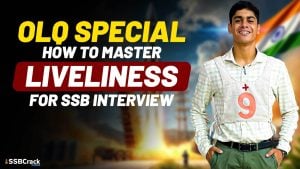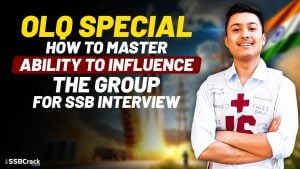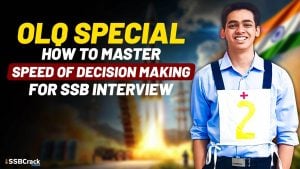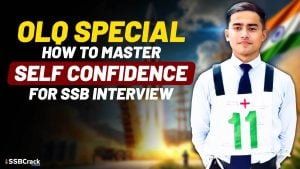The Internet is full of questions that are usually asked in the SSB interview and the follow-up answers by many experts and candidates there for the reference of the aspirants. If you are going to prepare for the SSB interview then you will be glad to know that the assessors at the SSB never judge the candidates based on a fixed parameter that applies to all the other candidates. Each candidate that comes to the SSB has a different basic profile and background that varies in many aspects such as education, financial condition, family, type of city they were brought up in, and opportunities that they were presented and carved out themselves.
They are assessed on these parameters, their reaction, and decisions in the past as well as in current life and on their performance during the testing in the selection centre solely. SSB isn’t a typical examination in which you have to compete with other candidates and rather in this exam, you have to touch the bar that is expected from you based on your profile. The interview technique is called “VAACHA” and it is among the core technique to assess a candidate and usually, an interview lasts for 45-60 minutes. The interview technique focuses entirely on your current life, past decisions and achievements, plans, and of course, you are looked for the necessary OLQs.
ALSO READ:
- How To Prepare For The SSB Interview Questions? Part 2
- 18 Tips To Develop Vacha: The Link Between Manasa And Karmana
This way it becomes very important that you prepare for the interview in a streamlined and focused manner. Any deviation in the form of questions, for which you aren’t prepared for, will make you nervous or will ask for unwarranted and divided attention.
We will discuss some points that will elaborate further on the appropriate ways in which you can take your SSB interview preparation and answer specific questions that are asked by the interviewer. These are some of the common details that most of the candidates failed to keep in track and their interview preparation usually goes haywire as they prepare in a zigzag manner. The detailed and elaborated interview technique in the SSB is unlike any other interview where you are tested for your skills but here you are tested for your personality.
Keep a Timeline of Your major life decisions
We all are aware that the interview is all about events and decisions in our life that has taken place and our future decisions that we will take based on our past experiences and future planning. To gather complete information about yourself, you are required to note down all the major events and concerning decisions of your life that will affect your future decisions. Starting from your class 10th result followed by the stream selection, class 12th result results in competitive examinations, type of college allotted, branch or stream selection, placement or no placement in college, job profile, further competitive exams if any, etc., should be kept at one place as umpteen number of questions will come out of your single decision made by you in the past. Sit at one place and think about these events and you will find that there will be a reason behind each one of them that will answer the questions of the interviewer such as what, why, when, how, and where. You should be clear in this aspect and have confidence in the decisions that you had made and that you are going to make.
Make A List Of Your Achievements In Concerning Fields
Since you have noted down all of your life decisions and events in one place, this should be followed by assessing all of your achievements in the fields of academics, sports, CCA activities, positions of responsibilities that you have held in the past. Your current achievements in the recent past in your schools such as handling the post of head boy and sports captain, or job or in competition examination life such as handling a big project or clearing a good examination for an esteemed post in any department should also be highlighted. The logic behind writing down these achievements is to boost your confidence as well as showcasing your credibility in front of the interviewer. Since the armed forces hold an “old school” and “traditional” thought process that’s why areas such as academics and sports are held in high regard. Your performance in these areas is evidence that you have been a good and sincere student and you can be trusted upon based on your previous consistent performances. They also need to see that if you can handle multiple things at once and that’s where your CCA activities involvements come into the picture as that ensure that this candidate doesn’t buckle under pressure and can handle many things simultaneously. Similarly, your performance at your workplace and competitive examinations tell about your seriousness regarding your future and current decisions and how well you are aware of the basics of your profile.
Introspect your decisions and raise questions from them
What, Why, How, When and Where are the basic five questions that arise out of everything that you will mention in front of the interviewer. For example, if you will tell him that you have chosen the science stream after your class 10th then the follow-up question will be about the reasons for your decision, the results you got from your decision, future implications if thought any and their sustainability along with other minor evaluations that will be drawn from that single decision of yours. Remember, the interviewer, however friendly he may seem is there to unveil the mask that you are trying to put on and that’s why it is suggested to not put any. The answers about every decision of yours must satisfy you first because if you can’t convince yourself about the reasons for your decisions then how can you convince a man whom you have just met and who’s sitting in front of you just to test you.
Improvise the responses
You have arranged all the relevant questions; try to seek their answers systematically. You won’t get the right answers for the first time as you know yourself just as the next person knows about you because in a daily routine we don’t emphasize knowing ourselves in the manner SSB wants us to. You will have to put a lot of time and effort to write down the answers to the questions with the help of your friends, teachers, colleagues, and family. The collective responses by these people can help you in determining your qualities that may be unknown to you about strengths and weaknesses that you don’t want to admit. With time, you will start getting the answers in the right manner as your mind will adapt to the responses and it will carve out the necessary information suitable for the interviewer to know about you. This sort of improvisation will help you in the long run and it comes based on your previous attempts or with a gradual understanding of your nature and behaviour.
Don’t hide your Weaknesses
It is evident that we all have weaknesses and strengths while many of us are aware of them, some of us aren’t aware of these. It is very shocking for the candidates when they sit down for the first time and don’t even know the basic questions about their personality such as their strengths and weaknesses. Usually, when we first note down our strengths and weaknesses then they are superficial and sound vague but when we explore more, we tend to realize the hidden meanings and patterns behind them. After sorting out these points, you should individually focus on them. People, often, hide their weaknesses and think that it will leave a negative impact on the interviewer but they don’t realize that every human has weaknesses and the crucial thing is that whether you are trying to turn them into your strengths or not. You don’t have to mask your weaknesses and should rather work upon them as the interviewer wants to know what you are doing to eliminate your weaknesses.
Make a stand for your decisions
Nobody likes a spineless man, definitely not the forces. If you have an opinion about something or a stand for anything then stick to it. Though you should be flexible in approach to accommodate different rational views if you get easily influenced by views of others without a substantial argument from them, then maybe you lack the substance to stand for your views. But at the same time, your views should carry rationality, reason, practical experience, and examples along with concrete facts as without these, your views and opinions are just baseless argumentative noises. Even if the interviewer is hammering you again and again and calling out your opinion without any substantial argument from his side or even if he seems to be biased and prejudiced, at that time you need to take your stand and remain firm. “Yes men” are liked in some circles but that won’t earn you respect.
These points, when seen in the context of the SSB interview technique, will provide the basis of answering questions in SSB Interview as most of us focus only on the questions and not on the motives and underlying meaning behind these questions. All the questions that are asked from us are about our life and that way the interviewer can know a lot about our qualities.
ALSO READ:
- How To Prepare For The SSB Interview Questions? Part 2
- 18 Tips To Develop Vacha: The Link Between Manasa And Karmana
You can prepare for defence entrance exams such as NDA, AFCAT, INET, and CDS by taking Written Online courses as they will not only give you access to full-length quality lectures but will also provide the facility to take standardized mock tests for better study and strategic growth in the exam. You can take multiple quizzes after each lesson to ensure the full understanding of the subject along with creating your customized lesson plans. You can check out the course content along with other important specifics at SSBCrack exams.
You can also access them through the SSBCrack Exams app available in the google play store.
Jai Hind


